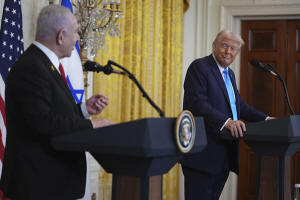'I won't leave. Put that in your brain.' Palestinians reject Trump's
call to expel them from Gaza
 Send a link to a friend
Send a link to a friend
 [February 06, 2025]
By WAFAA SHURAFA, SAMY MAGDY and JULIA FRANKEL [February 06, 2025]
By WAFAA SHURAFA, SAMY MAGDY and JULIA FRANKEL
DEIR AL-BALAH, Gaza Strip (AP) — Saeed Abu Elaish’s wife, two of his
daughters and two dozen others from his extended family were killed by
Israeli airstrikes over the past 15 months. His house in northern Gaza
was destroyed. He and surviving family now live in a tent set up in the
rubble of his home.
But he says he will not be driven out, after President Donald Trump
called for transferring all Palestinians from Gaza so the United States
could take over the devastated territory and rebuild it for others.
Rights groups said his comments were tantamount to a call for “ethnic
cleansing” and forcible expulsion.
“We categorically reject and will resist any plans to deport and
transfer us from our land,” he said from the Jabaliya refugee camp.
Trump’s call for depopulating Gaza has stunned Palestinians. Hundreds of
thousands in the territory rushed to return to their homes – even if
destroyed – as soon as they could following the ceasefire reached last
month between Israel and Hamas.
Though some experts speculated that Trump's proposal might be a
negotiating tactic, Palestinians across the region saw in it an effort
to erase them completely from their homeland, a continuation of the
expulsion and displacement of hundreds of thousands of Palestinians from
their homes in what is now Israel during the 1948 war surrounding its
creation.

That event is known among Palestinians as the “Nakba,” Arabic for the
“Catastrophe.” Trump's statement — a wild swing away from years of U.S.
policy — meshed with calls from far-right politicians in Israel to push
Palestinians out of Gaza, particularly into Egypt.
“We don’t want a repeat of our ancestors’ tragedy,” said Abu Elaish, a
health care worker.
Like many, Abu Elaish could point to his own family’s experience. In May
1948, Israeli forces expelled his grandparents and other Palestinians
and demolished their homes in the village of Hoj in what’s now southern
Israel just outside the Gaza Strip, he said. The family resettled in
Gaza’s Jabaliya camp, which over the decades grew into a densely built
urban neighborhood. Israeli troops leveled most of the district during
fierce fighting with Hamas militants over recent months.
Mustafa al-Gazzar was 5 years old, he said, when his family and other
residents were forced to flee as Israeli forces in 1948 attacked their
town of Yabneh in what is now central Israel.
Now in his 80s, he sat outside his home in the southern Gaza city of
Rafah, flattened by an airstrike, and said it was unthinkable to go
after surviving 15 months of war.
“You think you’ll expel me abroad and bring other people in my place?
... I would rather live in my tent, under rubble," he said. "I won’t
leave. Put that in your brain.”
“Instead of being sent abroad, I should return to my original land where
I was born and will die,” he said, referring to Yabneh, located near
what is now the central Israeli city of Yavneh. He said Trump should be
seeking a two-state solution. “This is the ideal, clear solution, peace
for the Israelis and peace for the Palestinians, living side by side,”
he said.
In his comments Tuesday alongside visiting Israeli Prime Minister
Benjamin Netanyahu, Trump said Palestinians from Gaza should be
resettled in lands in Egypt, Jordan or elsewhere, promising them a
“beautiful place.” Egypt and Jordan have both rejected Trump’s call to
resettle Palestinians on their soil.
Trump said the U.S. would take over Gaza and rebuild it into a “Riviera
of the Middle East” for “the world’s people,” dismissing the idea that
Palestinians would refuse to leave or want to return. Trump’s top
diplomat and his main spokesperson on Wednesday walked back the
president's proposal, saying he only wants to temporarily relocate
Palestinians from Gaza to allow for reconstruction.
[to top of second column]
|

President Donald Trump listens as Israel's Prime Minister Benjamin
Netanyahu speaks during a news conference in the East Room of the
White House, Tuesday, Feb. 4, 2025, in Washington. (AP Photo/Evan
Vucci)

Amna Omar, a 71-year-old from the central Gaza town of Deir al-Balah,
called Trump a “madman.”
Omar was able to go to Egypt during the war after her husband was
diagnosed with pancreatic cancer. In Cairo, doctors told them his
cancer had gone untreated for too long and he died in October.
She said she intends to go back home as soon as she can, as did
other Palestinians in Egypt.
“Gaza is our land, our home. We as Gazans have the right to the land
and want to rebuild it,” she said. “I don’t want to die in Egypt
like my husband. I want to die at home.”
Palestinians have shown a powerful determination to return to their
homes after nearly the entire population was displaced by the war.
Joyous crowds streamed back to northern Gaza and Rafah, both of
which were devastated by Israeli bombardment and ground offensives.
With their neighborhoods reduced to landscapes of rubble, many
returnees are homeless, water is scarce and electricity is largely
non-existent in most areas. Still, for most, the destruction has not
diminished their will to stay.
“We remain here, even if it means living in the rubble of our homes
— better that than living in humiliation elsewhere,” said Ibrahim
Abu Rizk, who returned to Rafah to find his home in ruins. “For a
year and a half, we have been slaughtered, bombed, and destroyed,
only to then leave just like that?”
The ceasefire deal brokered by the U.S., Egypt and Qatar, calls for
a return of Palestinians to their homes as well as a massive
international reconstruction effort in its third phase – assuming
Israel and Hamas can reach a deal on who will govern the territory.
International law forbids the forced removal of populations. The
Israeli rights group B’tselem said Trump’s statement “constitutes a
call for ethnic cleansing through uprooting and forcibly
transferring some 2 million people. This is Trump and Netanyahu’s
roadmap for a second Nakba of Palestinians in the Gaza Strip.”
Palestinian refugees have long demanded they be allowed to return to
homes in what is now Israel, citing the right to return widely
recognized for refugees under international law. Israel argues that
right does not apply to the Palestinians and says a mass return
would end the Jewish majority in the country.

Throughout the 15-month war in Gaza, many Palestinians expressed
fear that Israel’s goal was to drive the population into neighboring
Egypt. The government denied that aim, though some hard-right
members of the coalition called for encouraging Palestinians to
leave Gaza and for restoring Jewish settlements there. The
Israeli-occupied West Bank — home to more than 500,000 settlers —
has also seen more than a year of escalated violence.
The rejection of Trump’s call was echoed by Palestinians in the West
Bank and in surrounding Arab countries like Jordan and Lebanon that
are also home to large refugee populations.
“If he wants to displace the population of Gaza,” Mohammed al-Amiri,
a resident in the West Bank city of Ramallah, said of Trump, “then
he should return them to their original homeland from which they
were displaced in 1948, inside Israel, in the depopulated villages.”
___
Magdy reported from Cairo and Frankel from Jerusalem. Associated
Press journalists Mohammed Jahjouh in Rafah and Lee Keath in Cairo
contributed to this report.
All contents © copyright 2025 Associated Press. All rights reserved |